ChatGPT has become one of the most widely discussed topics on the internet in 2023. Its potential to astronomically alter countless jobs with its ability to instantly generate content based on a few simple prompts has not gone unnoticed by businesses. In this article, we will be exploring use cases and the latest trends regarding ChatGPT and GPT-4.
To gather data on the topic, we conducted a survey in which we asked individuals from the US, from all kinds of different backgrounds, about their experience using ChatGPT. Keep reading, because we will be sharing the results of this research in this article.
Many of the people we surveyed work in sectors like Education, Construction, Government and Public Administration, and Health Care, to name a few, the majority have University degrees and earn between $75,000 to $99,999 per year.
They shared their thoughts on how they plan to integrate ChatGPT into their workflow, the challenges they expect to face when using ChatGPT, and any ethical concerns they might have with the AI tool.
Interesting Facts about ChatGPT (Our Survey’s Key Findings)
- 79% of respondents named increased efficiency as ChatGPT’s main benefit.
- Customer service was the area with the most potential for ChatGPT, leading with 28%.
- According to 55% of people surveyed, the biggest challenge regarding ChatGPT was a lack of understanding of its technology.
- 61% of people surveyed thought that ChatGPT couldn’t replace humans.
- 43% planned to integrate ChatGPT into their workflow.
- Social media was where 36% of people surveyed planned to learn about the latest developments in Chat GPT-4 technology.
- In-person training sessions and online courses were reported as the two best ways for staff to learn how to use ChatGPT.
What is ChatGPT?
How familiar are people with Chat GPT? 45% of the people we polled said they were “Very familiar”.
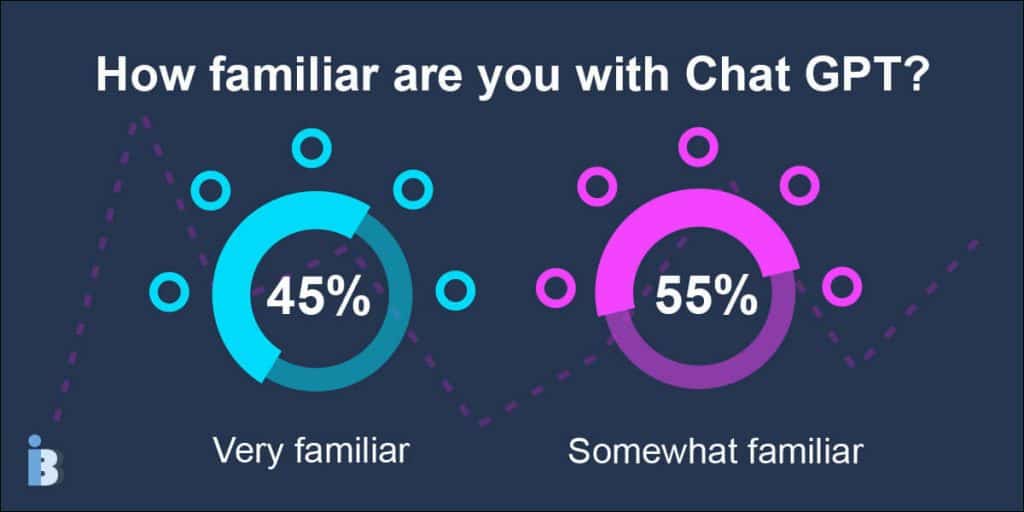
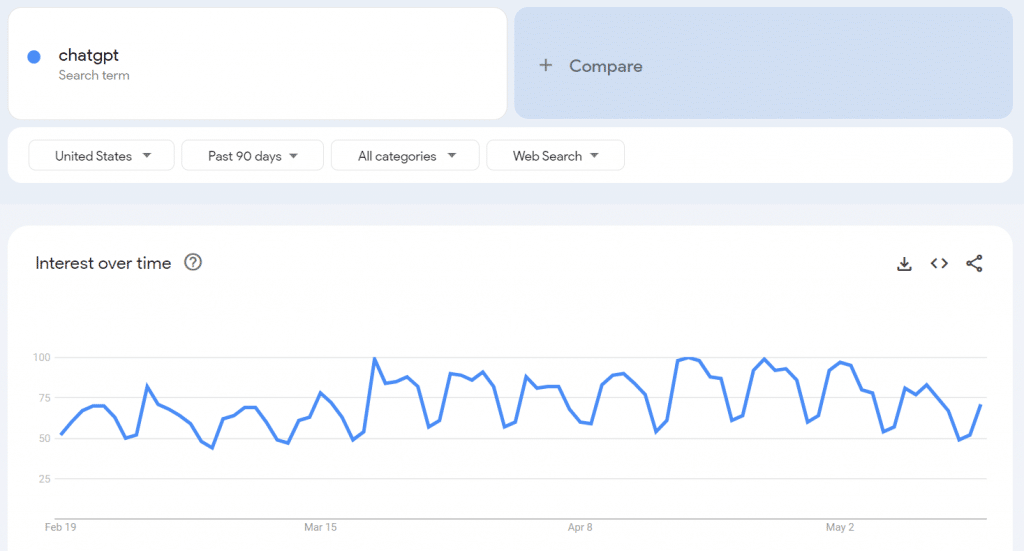
ChatGPT was released in 2022 by OpenAI and has become an absolute game changer in the way it’s able to instantaneously generate content. It can learn linguistic patterns and produce responses that resemble those of humans after being trained with a significant amount of text data.
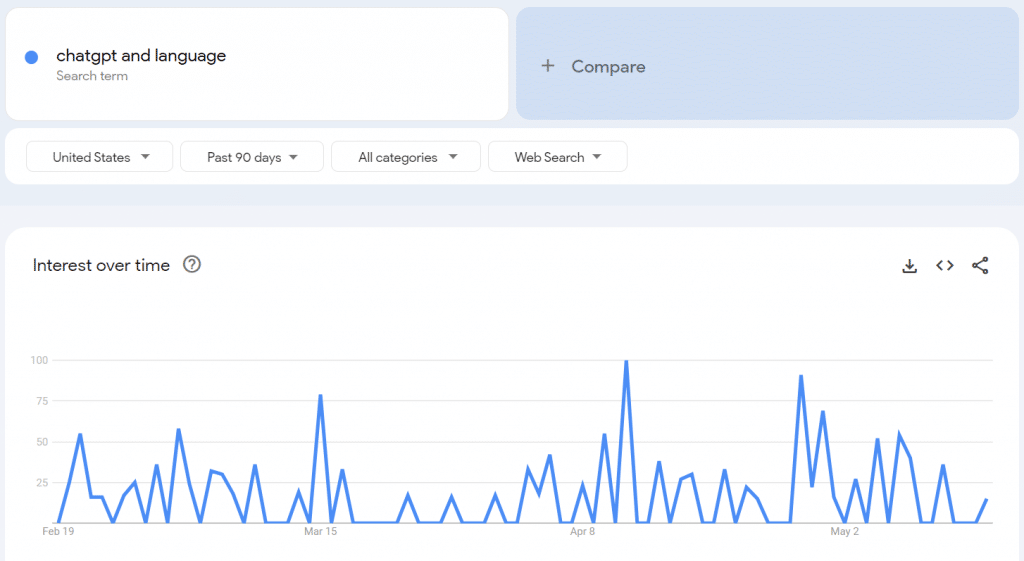
Answering trivia questions, creating essays, and having chats are just a few of the many tasks ChatGPT is capable of. To produce contextually appropriate responses, it makes use of a transformer architecture that processes text inputs and outputs with attention mechanisms. It has the potential to massively impact a wide variety of business sectors and society at large.
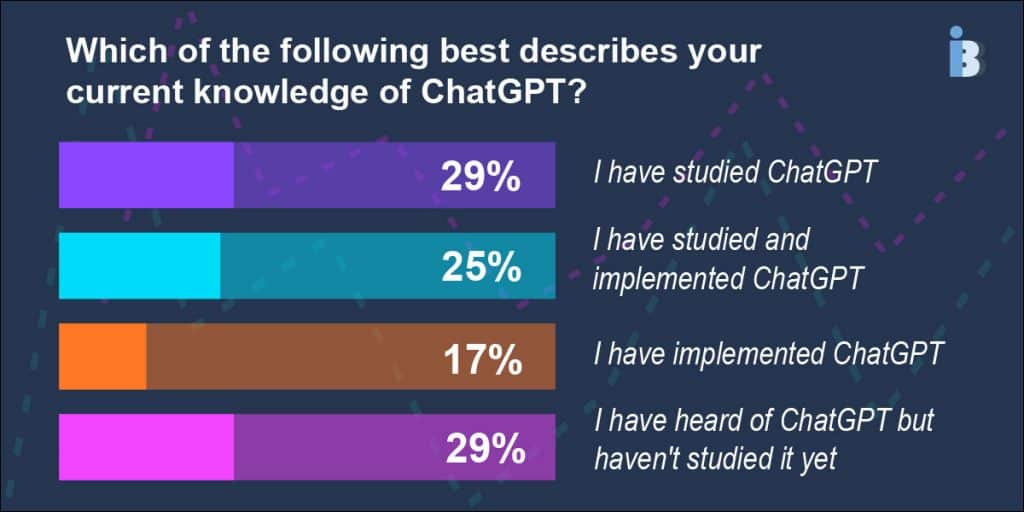
What is GPT-4?
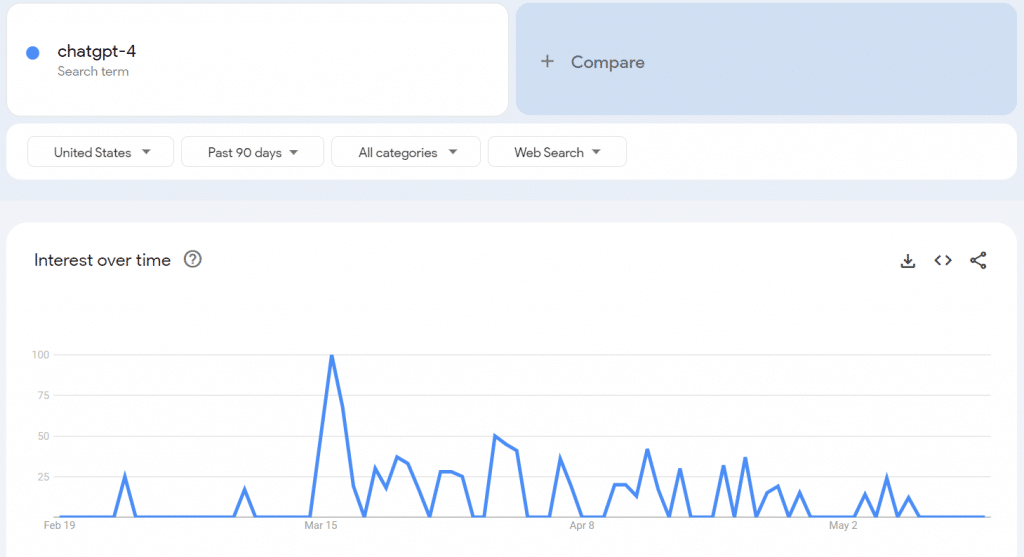
GPT-4 is a large multimodal language model from OpenAI that can produce text from both textual and visual input. Greater complexity than was able to be handled by earlier GPT models can be handled by GPT-4. On many academic and professional benchmarks, including the Uniform Bar Exam, the AI model performs at a level comparable to that of a human. It was created to enhance alignment and scalability.
43% of the people we surveyed said that they plan to implement ChatGPT into their work.
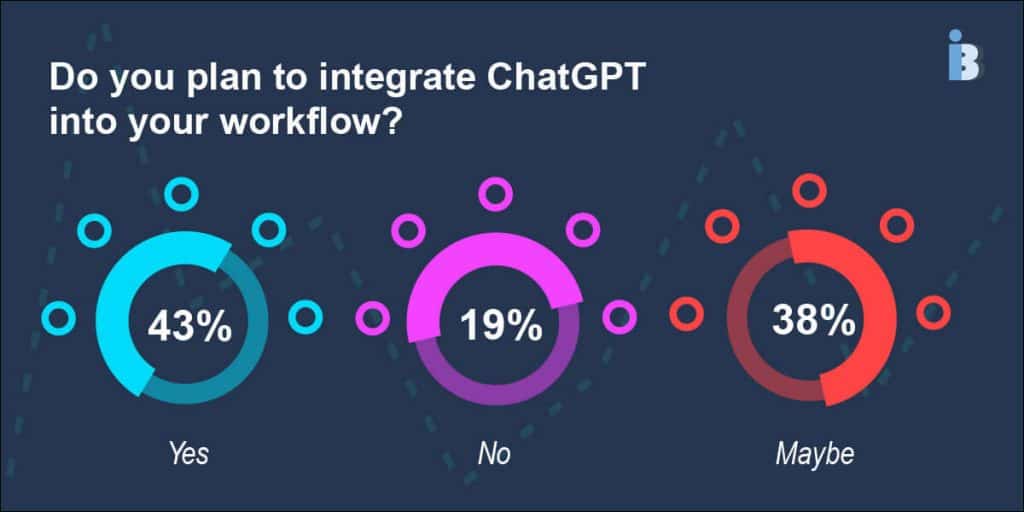
ChatGPT vs ChatGPT-4
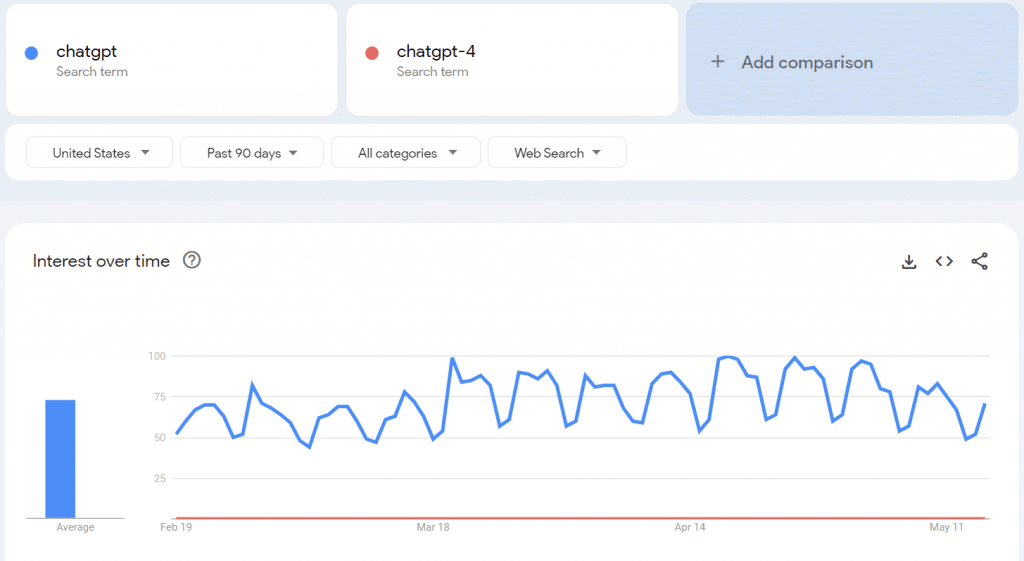
GPT-4’s extended memory is one of the most significant improvements. It allows the handling of more complicated jobs with greater precision and a wider variety of applications. GPT-4 performs better under pressure since it has more parameters and is more powerful than earlier iterations, notably GPT-3.
The ability to accept multimodal inputs, as opposed to ChatGPT and other iterations of GPT, is another considerable improvement in GPT-4. GPT-4 is accessible with a $20 monthly ChatGPT Plus membership, although ChatGPT Plus only supports text output at the moment. Additionally, ChatGPT plus users can access special tools like DALL·E, Browsing, Advanced Data Analysis, and more.
OpenAI plans to expand its GPT-4 model with many new features. For instance, as of September 2023, ChatGPT Plus supports voice input, allowing users to engage in back-and-forth conversations with the AI bot. This feature is available on the mobile app for iOS and Android and it’s powered by a new text-to-speech model.
How likely are people to recommend ChatGPT to a colleague? 42% of the people we surveyed said “Very likely”.
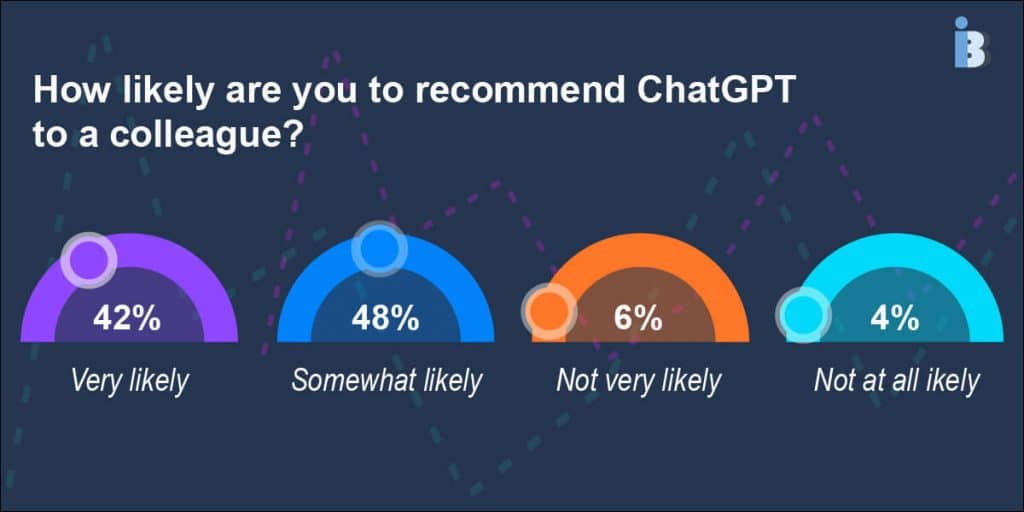
Benefits of ChatGPT
1. Cost-effective
According to 19.76% of the people asked in our survey, the greatest advantage of using ChatGPT was reduced labor costs.
The low cost of ChatGPT is what makes it so fantastic. It can help with many different jobs, including writing, summarizing, translating, and responding to frequently asked inquiries.
ChatGPT is a free alternative to ChatGPT Plus, which is a more sophisticated version. Small organizations, content producers and people searching for an AI-powered large language model with a wide variety of skills might choose it because of its reasonable price.
2. Improved customer satisfaction
According to 24.51% of the people asked in our survey, the biggest benefit of using ChatGPT was improved quality of service.
ChatGPT is the perfect tool for enhancing customer satisfaction because of its conversational interface and natural language processing capabilities. It can comprehend and interpret consumer demands, deliver individualized replies, and provide prompt, precise solutions to issues. Customer satisfaction has grown, response times have decreased and customer engagement has improved thanks to the use of ChatGPT as a customer care chatbot.
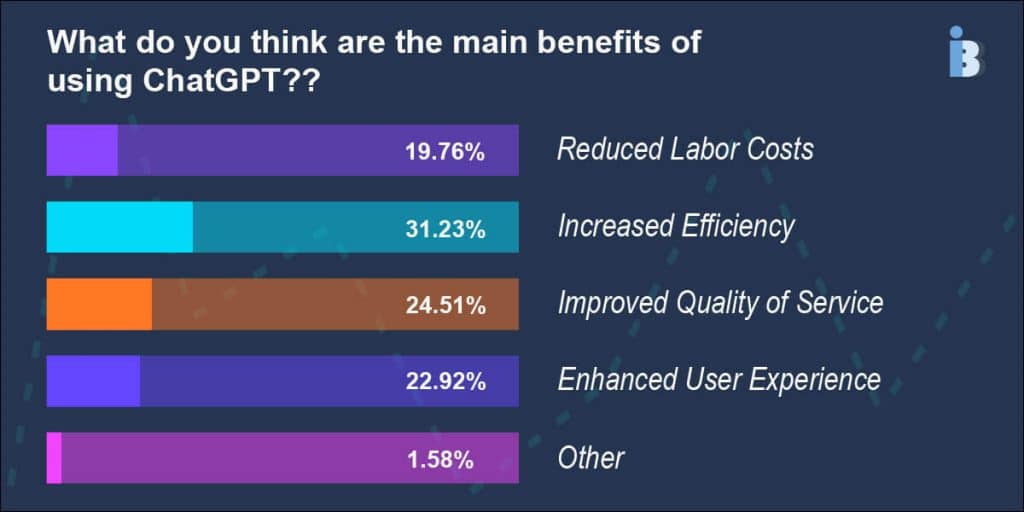
3. Time-saving
31.23% said that the main reason they planned to integrate ChatGPT was because of increased efficiency.
ChatGPT is a useful, time-saving tool since it can comprehend and reply to natural language requests in real-time. It can reduce the strain on human customer care personnel by quickly responding to frequently requested inquiries with automated replies.
Customers can get support whenever they need it with ChatGPT as it is available around-the-clock. Businesses are able to save time and increase customer service operations efficiency by using ChatGPT.
4. Consistent responses
According to 22.92% of the people asked in our survey, the biggest benefit of using ChatGPT was enhanced user experience.
One advantage of ChatGPT is its capacity to offer consistent replies to clients, removing the possibility of human error and guaranteeing that each client receives the same standard of service. Customer satisfaction and brand trust may flourish as a result.
Additionally, ChatGPT’s consistency helps shorten resolution times by streamlining customer care procedures.
5. 24/7 availability
Customers can have their questions addressed at any time of day, without delay or waiting time, thanks to ChatGPT’s round-the-clock availability. Offering prompt support not only saves time but also improves client satisfaction.
Additionally, ChatGPT’s accessibility guarantees that companies can serve a worldwide clientele across various time zones without spending extra money or resources.
6. Possible impact on job displacement and the jobs that might be affected
According to 21.13% of the people surveyed, the biggest challenge they believed they would face with ChatGPT was resistance to change from employees.
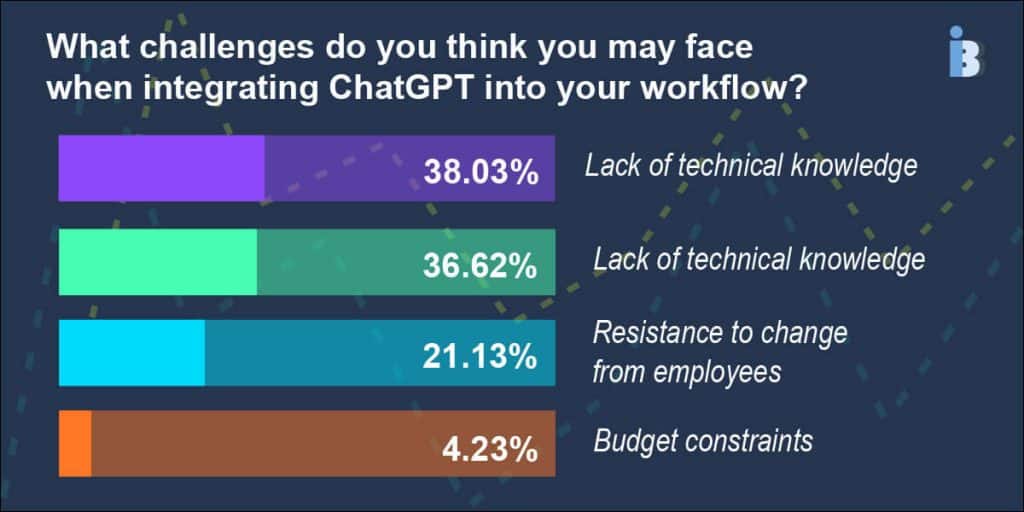
ChatGPT offers the ability to automate repetitive operations in occupations like customer service. Human agents may become redundant as a result, however, it also opens up prospects for new occupations like data analysts and machine learning engineers. Agents working in call centers, customer service agents, and help desk professionals may all be impacted.
We asked ChatGPT to name 20 jobs that could be replaced by AI systems and here’s the list it generated for our research:
| Number | Job | Human Trait Replaced |
| 1 | Telemarketer | Persuasion |
| 2 | Data Entry Clerk | Attention to detail |
| 3 | Receptionist | Communication |
| 4 | Translator | Language proficiency |
| 5 | Proofreader | Attention to detail |
| 6 | Accountant | Analytical thinking |
| 7 | Travel agent | Knowledge of travel industry |
| 8 | Bank Teller | Math skills |
| 9 | Insurance Underwriter | Risk assessment |
| 10 | Tax Preparer | Knowledge of tax laws |
| 11 | Customer Service Representative | Communication |
| 12 | Retail Salesperson | Persuasion |
| 13 | Delivery Driver | Physical labor |
| 14 | Warehouse worker | Physical labor |
| 15 | Construction worker | Physical labor |
| 16 | Line Cook | Physical labor |
| 17 | Data Analyst | Analytical thinking |
| 18 | Security Guard | Vigilance |
| 19 | Social Media Manager | Creativity |
| 20 | Copywriter | Creativity |
31.23% of the people we surveyed said that the main benefit of ChatGPT was “Increased Efficiency.”

Use Cases of ChatGPT
1. Customer Service and AI chatbot assistants
28% of the people we surveyed stated that ChatGPT had the most potential in the Customer Service sector.
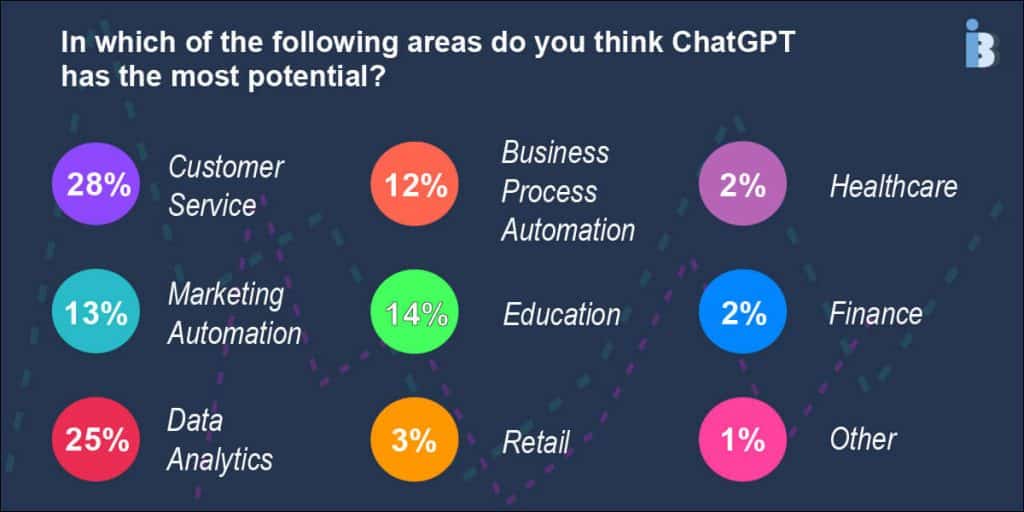
ChatGPT functionality can be tweaked to produce chatbots that comprehend client inquiries and provide conversational responses. Chatbots can be taught to give tailored replies that resemble human interactions by utilizing their natural language processing skills. Overall customer experience can be improved and consumer engagement increased as a result.
2. Content Generation
Only 13% of the people we surveyed believed that ChatGPT had the most potential in marketing automation.
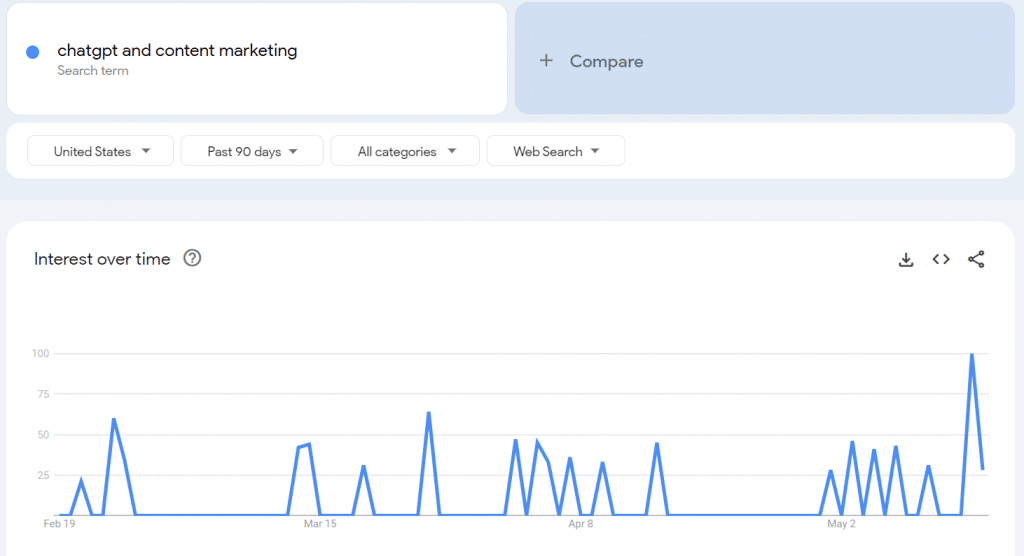
ChatGPT has enormous potential to generate content for numerous industries e.g. news, social media, advertising, etc. What makes it so useful is that it can analyze and process vast amounts of data. It can then almost instantaneously generate content based on the information it’s processed, making it highly valuable for businesses.
“Overall, I firmly believe that ChatGPT has the potential to revolutionize the content creation process. As technology advances, I expect to witness even more use cases and benefits emerge.” — Jan Suski, Head of Content at Milosz Krasinski
It can be used to produce content that specifically caters to a business’s target demographic, in order to improve a company’s marketing and SEO efforts, as well as increase its revenue.
“ChatGPT can assist marketers in a variety of ways, but especially SEO professionals. As an SEO specialist, ChatGPT has aided me in my work by suggesting better keyword placement, title tags, meta descriptions and headers. This has improved the content’s ranking on search engine results pages.” — Kelly Chan, Kinore
3. Job Interviews
By generating interview questions and offering advice on how to ace interviews, ChatGPT can help job seekers. ChatGPT can simulate real-life interview situations and assist candidates in practicing their responses, boosting their confidence and communication skills. In order to aid job seekers in their preparation, ChatGPT can also offer insights on company cultures, job expectations, and market trends.
“One game-changing use of ChatGPT is the ability to quickly draft candidate summaries. Asking the AI to condense a resume into an introductory brief saves you precious time you can use for other important tasks.” — Andrew Chen, Chief Product Officer at Videeo
4. Banking
By examining enormous amounts of data and locating potential risk factors, ChatGPT can help banks. It can extract relevant information from a range of sources, such as news stories and financial reports, using its highly developed natural language processing capabilities, and provide insights on potential hazards. In order to increase efficiency and accuracy, ChatGPT can also assist banks in automating risk management procedures like fraud detection and credit risk assessment.
44% said that it was somewhat important to integrate ChatGPT in their current technological stack.
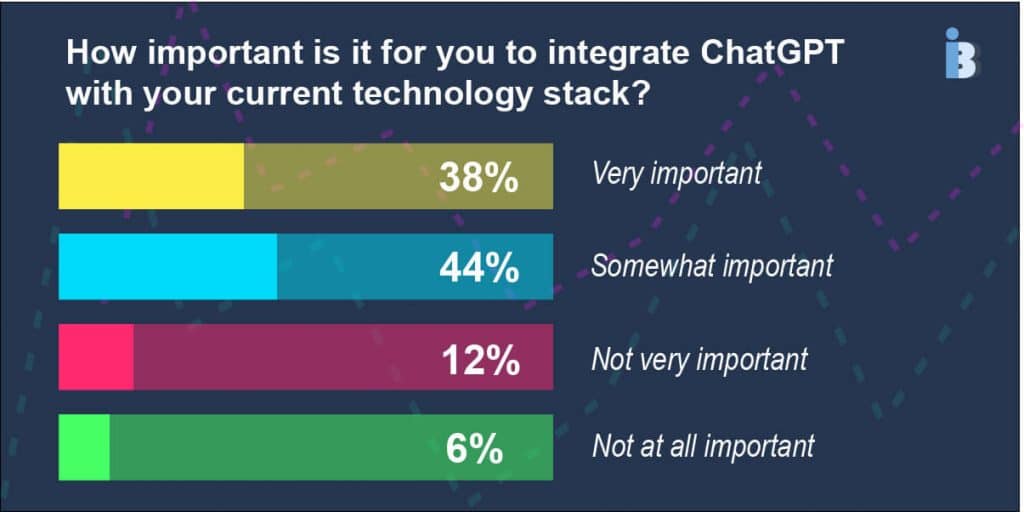
26.90% of the people surveyed planned to use guides and tutorials to train their staff on how to use ChatGPT.
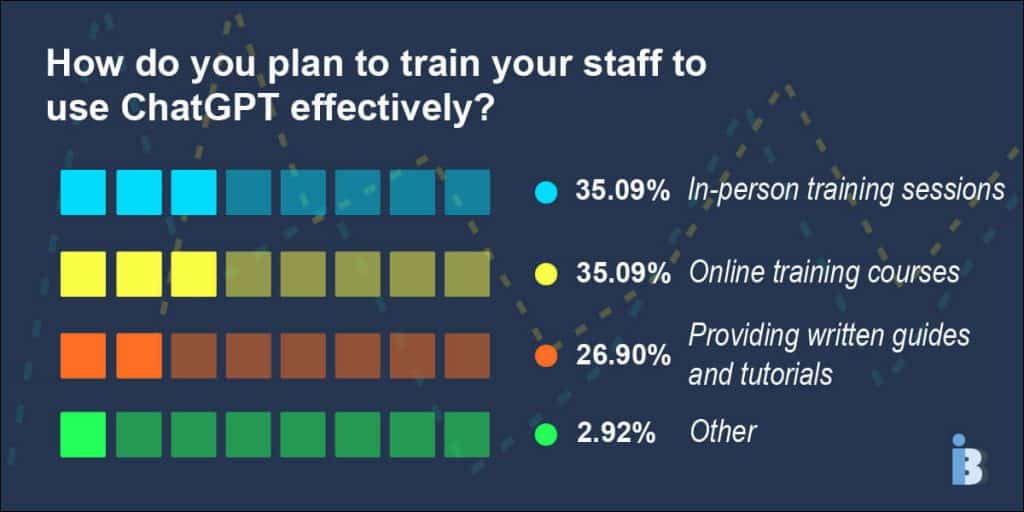
5. Medical Transcription
ChatGPT can be used to transcribe medical reports and notes, minimizing the need for human transcriptionists and therefore the chances of human error. ChatGPT can reliably and effectively transcribe medical dictation by integrating natural language processing and machine learning algorithms, saving healthcare practitioners considerable time. ChatGPT can also give clinical decision support to healthcare workers by evaluating patient data and giving recommendations, leading to more informed decision-making and better patient outcomes.
6. Coding Help
ChatGPT’s natural language processing features can help you write simple code and develop website pages. ChatGPT can assist users without coding expertise in creating simple website pages by reading user input and generating code. Thanks to these technological developments, the process becomes more efficient and accessible to users.
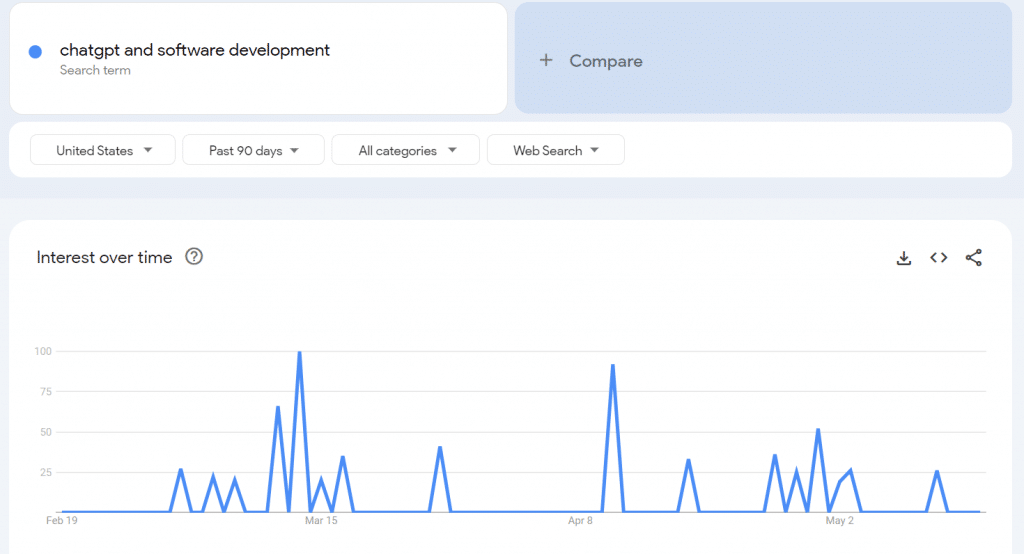
“ChatGPT’s ability to write simple code is incredible. You’ll run into some errors, but you can send those to ChatGPT and it will update the code. It takes some time, but you’ll usually end up with a workable solution in an hour or two.” – Roy Harmon, LeadPost
7. Analytics
25% of the people surveyed believed that ChatGPT had the most potential in data analytics.
ChatGPT’s machine learning algorithms and natural language processing capabilities can be used to analyze data and offer insights. Large data sets can be interpreted and analyzed by ChatGPT to find patterns, anomalies and trends, as well as offer users insightful information and suggestions. This can aid both businesses and individuals in making better decisions and maximizing their operations.
52% of the people we surveyed said that in terms of accuracy, ChatGPT was “Good.”
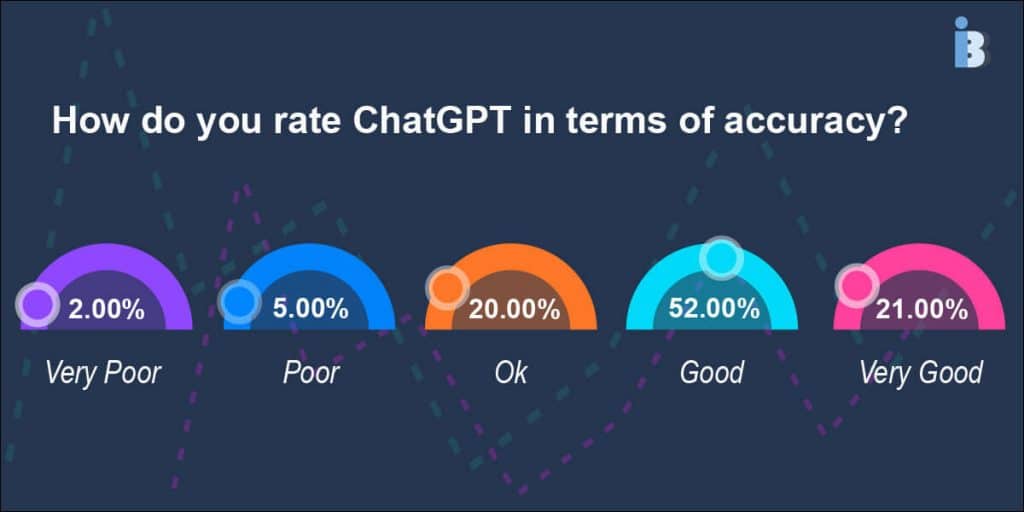
8. eCommerce
By examining customer data and behavior, ChatGPT can help e-commerce businesses to personalize product recommendations and enhance customer experience. ChatGPT can recognize customer preferences and make specialized product recommendations using natural language processing and machine learning algorithms.
Offering a more individualized shopping experience, can enhance customer experience and ultimately increase customer satisfaction and loyalty.
9. Language Translation
By utilizing its natural language processing capabilities and multilingual training data, ChatGPT can help with language translation. ChatGPT can produce precise translations into another language by analyzing and interpreting the text in a selected language.
When people and organizations that speak different languages can better communicate and understand one another, interactions become more efficient and fruitful.
10. Educational Applications
Only 14% believed that ChatGPT had the most potential for education purposes.

By offering personalized learning opportunities and automated question-answering, ChatGPT can help with educational applications. ChatGPT’s natural language processing capabilities enable it to instantly respond to questions from students and give them feedback.
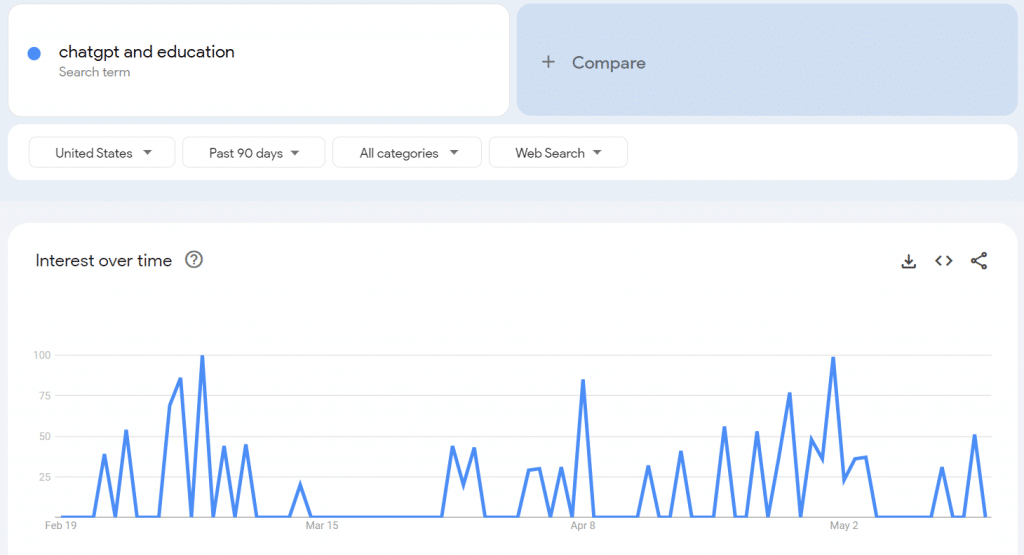
Additionally, it can examine student learning data and make tailored recommendations for additional study, ultimately enhancing student engagement and results.
Current Trends of ChatGPT
52% stated that the main reason for considering ChatGPT integration was increased efficiency.
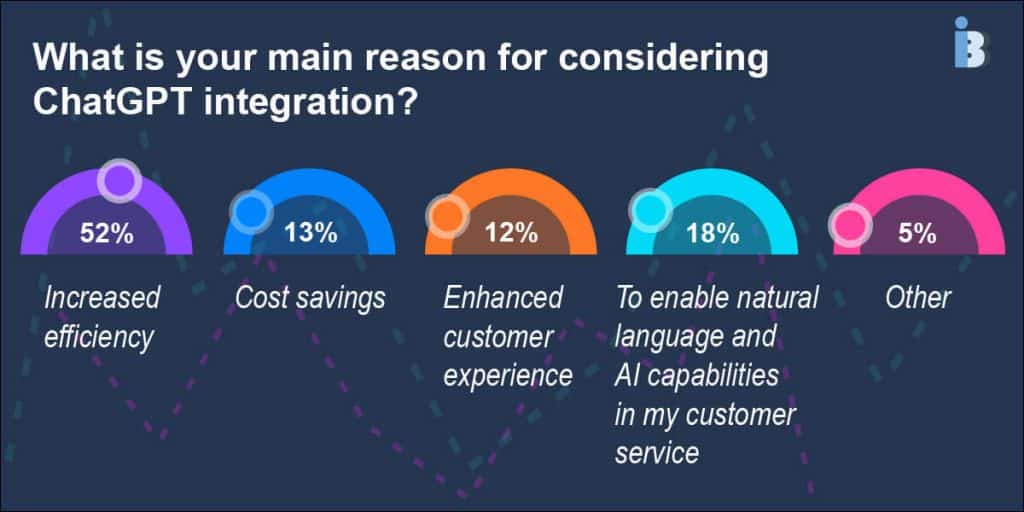
Integrating ChatGPT with other technologies and platforms, such as AR and VR, is becoming more and more popular. Users can engage with virtual worlds and get real-time information through this integration using natural language processing. Thanks to this, users get a more immersive experience that is highly customizable and can be applied to numerous industries.
Another trend is that natural language processing (NLP) and chatbots are continually changing and adapting. Chatbots are becoming smarter and better at comprehending and responding to complicated requests thanks to recent developments, such as machine learning algorithms and deep learning techniques.
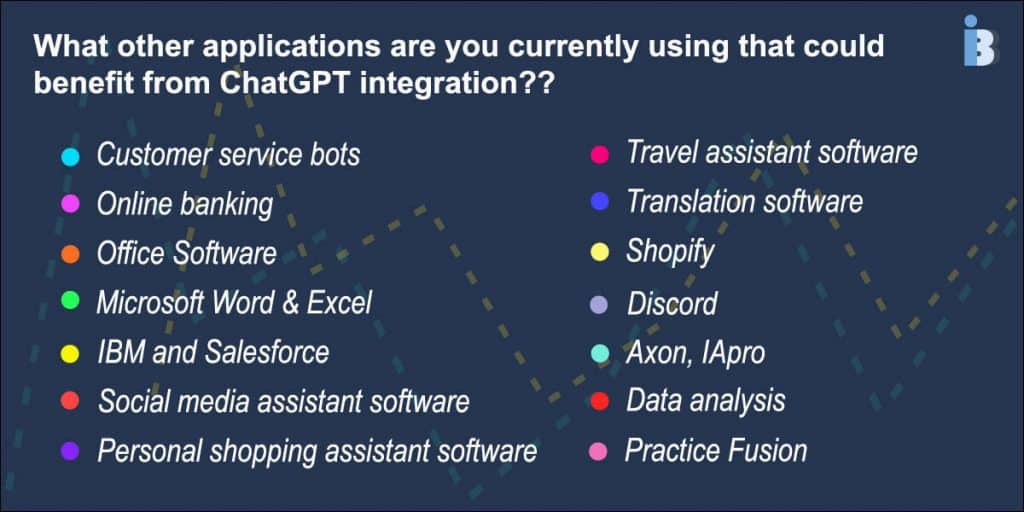
The potential uses of chatbots are expanding by incorporating other technologies like speech recognition and augmented reality, creating more individualized and engaging experiences. The potential of chatbots looks extremely promising.
46% answered that the most important aspect in the ChatGPT Industry was a better understanding of the technology of ChatGPT.
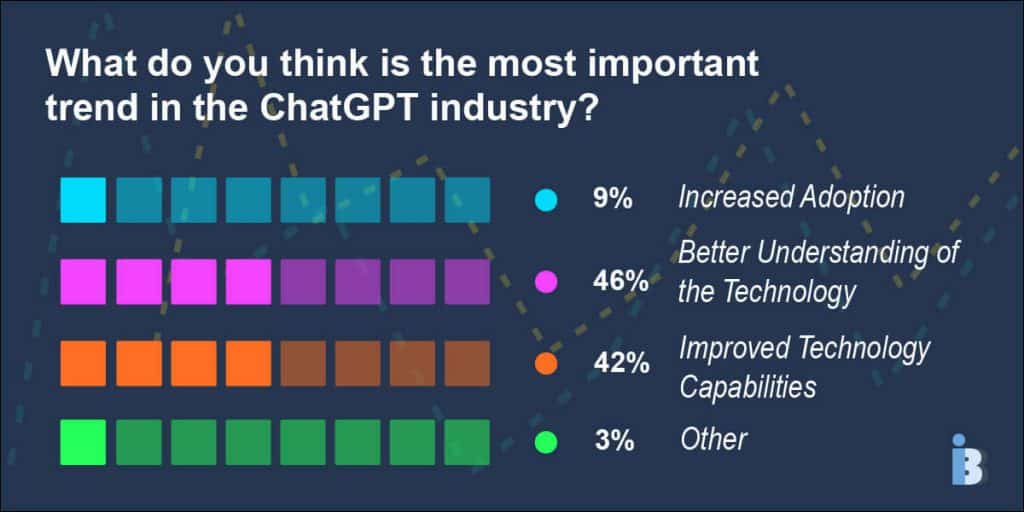
“The developments and new applications of ChatGPT now underway are fascinating. A growing number of companies are realizing that chatbots driven by artificial intelligence may vastly enhance their customer service and internal processes.” – Vladimir Fomenko (PR User), Founder at Infatica
In terms of how they planned to stay up-to-date on the latest developments of ChatGPT-4 technology, 36% said “following ChatGPT-4 on social media.”
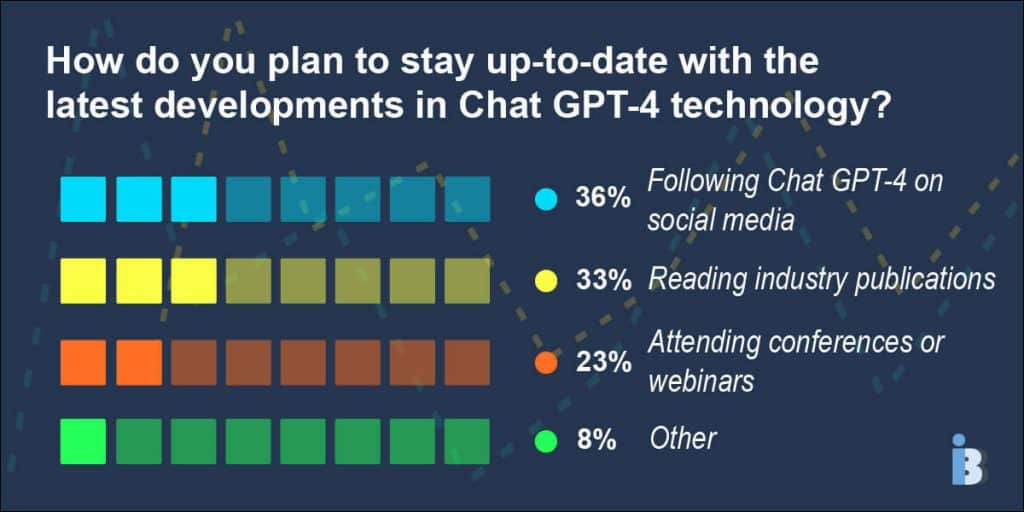
ChatGPT is also making waves in the healthcare sector. Increasing patient participation and results using ChatGPT is revolutionizing the healthcare sector. ChatGPT is promoting smoother communication between healthcare practitioners and patients, easing administrative processes and even assisting with the early diagnosis of illnesses by utilizing its natural language processing capabilities.
By enabling people to manage their health in a more individualized and knowledgeable manner, these developments are paving the way for a more patient-centered healthcare experience.
The process of creating sophisticated and specific ChatGPT models is becoming more prevalent. To better serve specialized areas like healthcare, banking, and customer service, researchers are modifying models. These models are built to handle challenging problems, predict results, and even provide conversational answers that resemble human interaction.
The creation of specific ChatGPT models is expected to transform how businesses and industries communicate with their clients, patients, and consumers.
35.09% of the people surveyed planned to use online training courses to train their staff on how to use ChatGPT effectively.

An increasing trend is the integration of ChatGPT with various systems and platforms. Virtual reality, augmented reality, and speech recognition technologies are being combined with AI-generated chatbots to produce more immersive and captivating experiences.
In order to obtain insights and enhance business operations, ChatGPT is also utilized in conjunction with machine learning and data analytics technologies. Customer and corporate interactions will become more tailored and effective thanks to this connection.
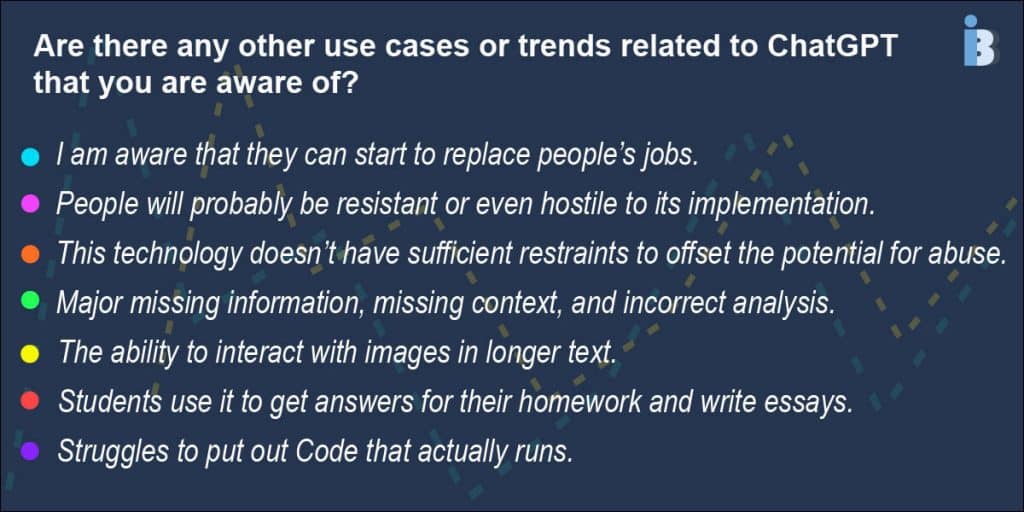
The Future of ChatGPT Updates and Generative AI
When asked about the biggest impact ChatGPT would have in the long term, 29.69% said “Increased efficiency and reduced labor costs.”
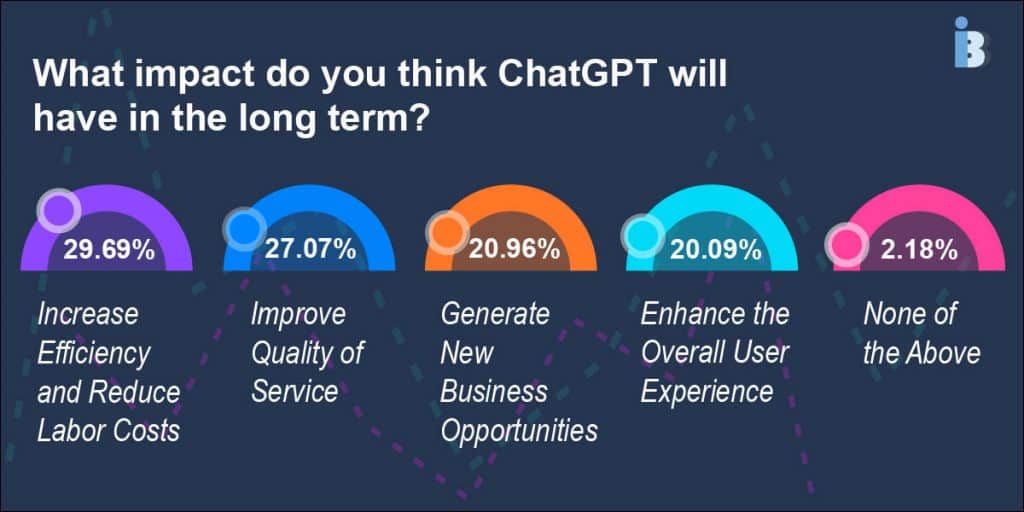
“The impact of ChatGPT on society and business overall is significant. By automating routine tasks and streamlining workflows, ChatGPT has the potential to increase productivity, reduce costs, and improve customer satisfaction. However, it is essential to consider the potential ethical implications of AI language models and ensure that they are developed and used responsibly.” – Iu Ayala, CEO and Founder at Gradient Insight
43% of the individuals we surveyed planned to integrate ChatGPT into their workflow.

1. Advancements in AI Technology
Future developments in new AI technology may result in sympathetic computers that can comprehend human emotions and react accordingly, as well as AI-powered virtual companions that can provide individualized assistance and companionship.
Space exploration and colonization might be facilitated by AI by allowing the development of completely independent, self-sustaining societies in distant worlds.
20.96% believed that ChatGPT’s ability to generate new business opportunities would be its biggest long-term impact.

2. Integration with Other Emerging Technologies
The introduction of ChatGPT into virtual and augmented reality settings, enabling more immersive and organic interactions, is one potential future use of ChatGPT’s integration with other developing technologies.
Furthermore, ChatGPT may be used with blockchain technology to provide private and secure data sharing.
Additionally, ChatGPT might be used in conjunction with IoT gadgets to enable seamless voice-activated automation and control in smart settings like houses.
3. Improved Natural Language Processing Capabilities
42% believed that the most important trend in the ChatGPT industry was “improved technology capabilities”.

ChatGPT’s future potential for enhanced natural language processing includes the creation of more complex algorithms that can correctly decipher the subtleties of spoken languages, such as tone, context, and purpose.
This could result in chatbots, virtual assistants, and customer service representatives that are more sophisticated and capable of understanding and addressing human needs.
Further bridging the gap between cultures and languages, increased natural language processing may also make it easier to develop more sophisticated language learning resources and translation services.
Do you think ChatGPT can handle complex tasks? 54% of the people we surveyed said “Yes.”
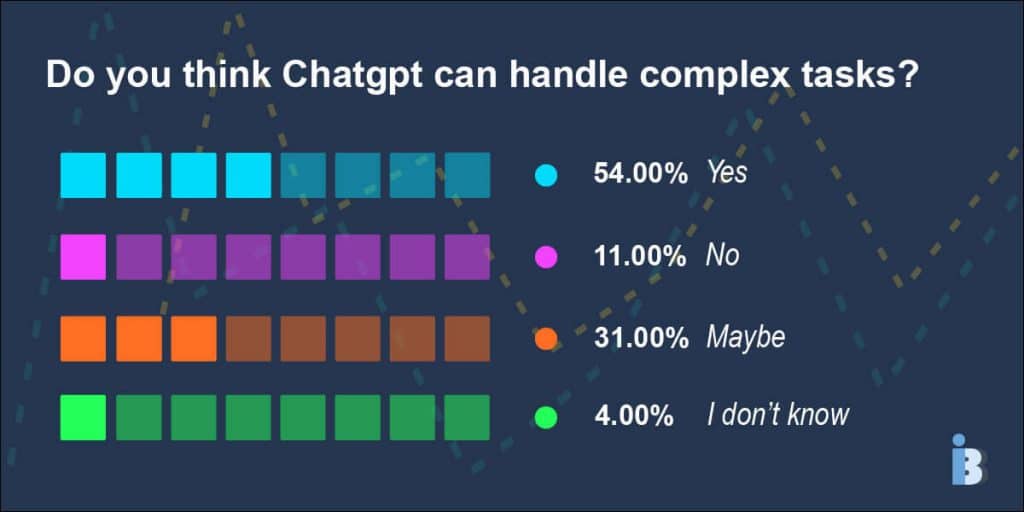
4. Greater Personalization
The creation of algorithms that can learn and adjust to the routines and communication preferences of specific users is a possible next step in the future of ChatGPT’s further customization.
This would make it possible for ChatGPT to offer more individualized suggestions and replies, enhancing user engagement and happiness. In order to offer a fluid and customized experience across different platforms and locations, personalized ChatGPT could also be connected with other technologies, such as virtual assistants and IoT devices.
20.09% believed that its ability to enhance overall user experience would be ChatGPT’s biggest long-term impact.

Challenges and Limitations of ChatGPT and AI Tools
36.62% reported “lack of technical knowledge” as the biggest challenge they thought they would face when they eventually integrate ChatGPT into their workflow.

1. Limited Context Understanding
ChatGPT’s limitation of not completely understanding the nuanced aspects of human language and context is referred to as a limited context understanding. In some circumstances, this might result in misunderstandings and inappropriate reactions to AI prompts from ChatGPT users.
That being said, recent work in machine learning and natural language processing aims to create more sophisticated algorithms that can better comprehend the complexity of human communication and interpret context, potentially enhancing ChatGPT’s contextual understanding in the future.
2. Biases in Training Data
25.84% believed the lack of data used to train the system to be one of ChatGPT’s greatest challenges.
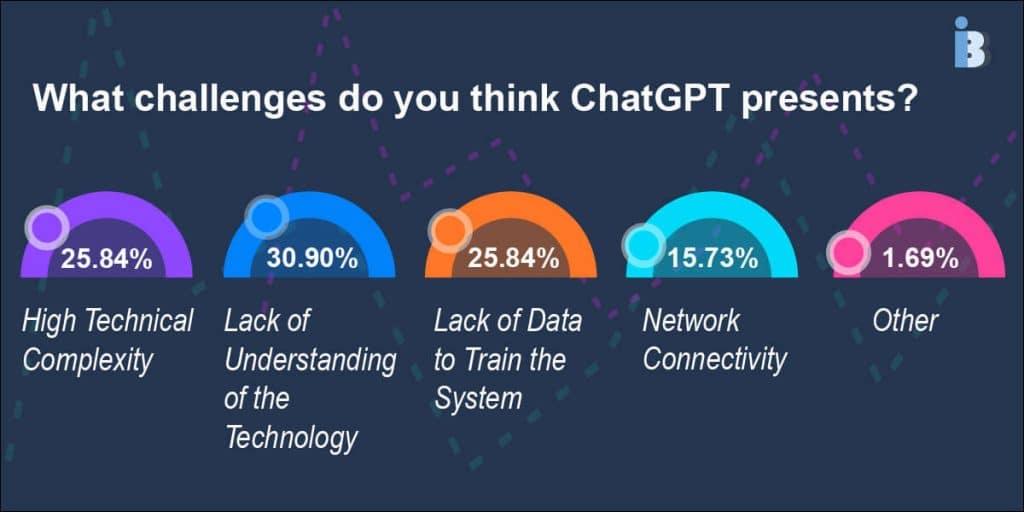
The biases in ChatGPT’s training data bring the possibility that the information used to train the model could reflect social prejudices and preconceptions, which might affect the model’s predictions. As a result, prejudice and inequity could persist.
In order to guarantee that ChatGPT is created and used ethically, ongoing efforts are being undertaken to create more diverse and inclusive training data as well as strategies to spot and reduce biases in the model’s output.
3. Lack of Emotional Intelligence
ChatGPT being unable to comprehend and react to emotional states in people completely is a prime example of its lack of emotional intelligence. Despite being able to perceive and create text-based emotions, ChatGPT is unable to completely grasp and sympathize with its users’ emotional states.
The goal of ongoing research in affective computing and natural language processing is to create more complex algorithms that will enable ChatGPT to comprehend and react to human emotions more effectively.
4. Security Concerns
What do you think about the security and privacy implications of ChatGPT technology? 55.56% of the people we surveyed said they had “Some concerns.”
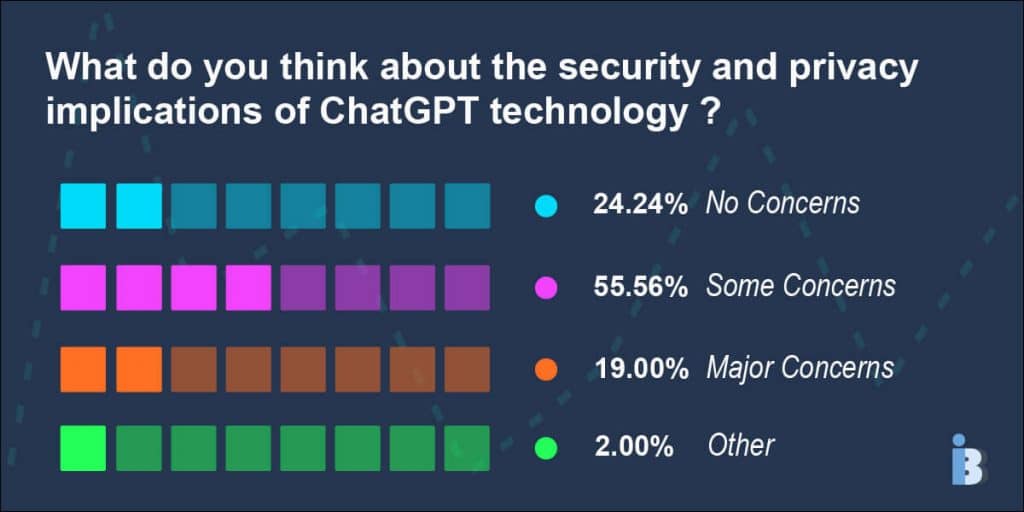
The potential for ChatGPT to be used maliciously, such as to create fake news or impersonate people, is one of ChatGPT’s fundamental security issues. Concerns about data privacy and protection are heightened by the fact that the information given by ChatGPT is sensitive and personal in nature. Several countries have even temporarily banned ChatGPT over concerns about privacy and unforeseen consequences of using AI.
As part of ongoing research, strategies for deploying ChatGPT that are safe and protect user privacy are being developed. Users are also being instructed on the best ways to utilize the model responsibly and safely.
61% answered “no” when asked if ChatGPT could replace humans.
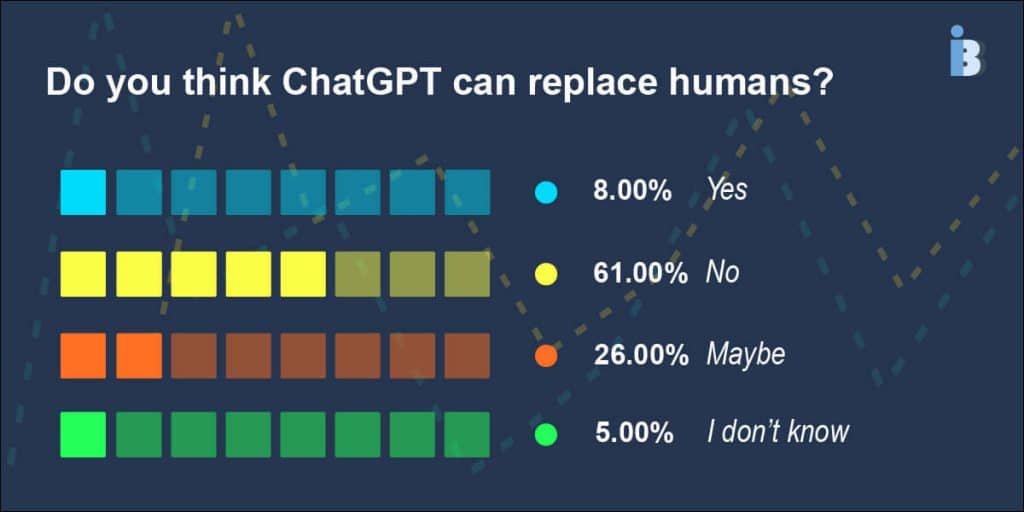
“AI advances promise greater efficiency, optimization and resources for creativity. But as ChatGPT and other AI technologies are integrated into areas of work and life, they should be viewed as exactly that — a resource, not a replacement.” – Tony Fernandes, CEO at UE Group
The biggest concerns individuals expressed about ChatGPT:
- 22.54% said, “It’s not reliable enough.”
- 21.13% replied that ChatGPT is too complicated to use.
- 13.38% said, “It’s not ethical.”
- 40.14% responded with “Lack of technical knowledge.”
- 2.82% have other concerns about ChatGPT
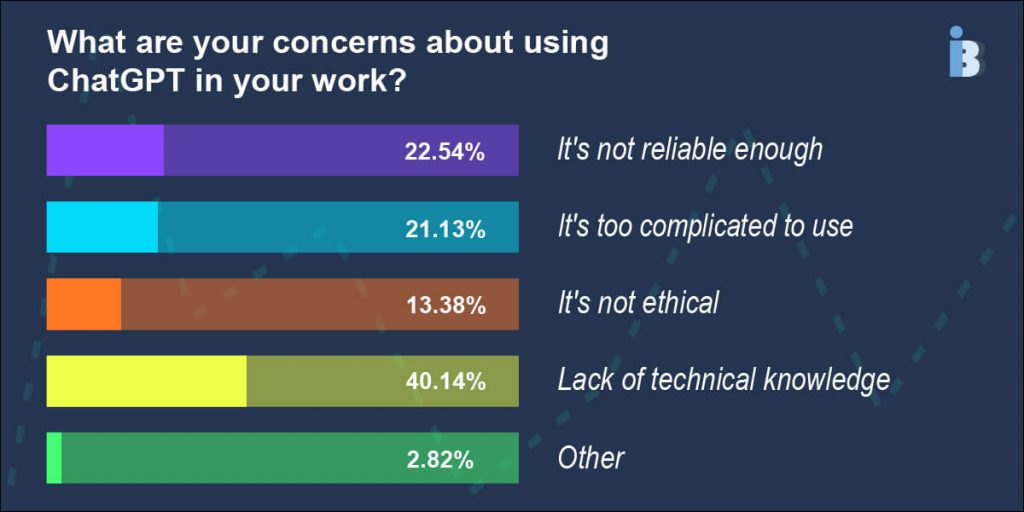
Conclusion
In conclusion, ChatGPT is an effective tool with enormous potential to help organizations and people in a variety of sectors. Numerous applications, such as virtual assistants and chatbots, have been made possible by its capacity to comprehend and react to human language.
Although there are challenges with ChatGPT’s restrictions and ethical issues, current research is endeavoring to resolve these concerns and unleash even more possibilities for this cutting-edge technology.
The use of ChatGPT is going to become more and more prevalent. It’s evolving at a rapid pace with each new version that is released. Similarly, the level of sophistication in the way it produces content and answers queries is becoming more refined.
It’s here to stay, which is why it’s crucial for people from all kinds of different professional backgrounds to understand and keep up to date with the evolution of this AI tool.
FAQs:
How does ChatGPT work?
ChatGPT works by using machine learning algorithms to generate human-like responses to user inputs based on a large corpus of training data.
What are some of the most common use cases for ChatGPT?
Some of the most common use cases for ChatGPT include virtual assistants, customer service chatbots, and language translation tools.
What are some of the limitations of ChatGPT?
Some of ChatGPT’s limitations include its limited context understanding, lack of emotional intelligence, and potential biases in training data.
How can ChatGPT be integrated with other technologies and platforms?
ChatGPT can be integrated with other technologies and platforms through APIs or SDKs, allowing it to be used in a wide range of applications, such as virtual assistants, chatbots, and IoT devices.
Is ChatGPT available for free?
Yes, OpenAI has made the basic version of ChatGPT available for free, allowing users to access its conversational AI capabilities. The free tier of the AI chatbot includes only the GPT 3.5 model.
What devices support ChatGPT?
ChatGPT is versatile and available for various platforms, including a ChatGPT app for Android and iOS, making it accessible to a wide range of devices and users.
Can you use ChatGPT prompts and other AI chatbots for writing code or programming tasks?
Yes, you can use OpenAI’s ChatGPT to write new AI-generated answers in multiple programming languages or improve already existing code. However, even though ChatGPT can write code and is capable of handling complex tasks, it can make errors and include security vulnerabilities in the code it generates.
Who is Sam Altman and how is he associated with OpenAI?
Sam Altman is the CEO of OpenAI. He is instrumental in leading the creation and deployment of large language models like ChatGPT. On November the 17th 2023, OpenAI announced on their blog that Altman was dismissed from his position as chief executive. Several days later, Altman announced he had returned to OpenAI after a new leadership board was assigned.
Are there any notable figures associated with the development of ChatGPT?
Notable figures associated with the establishment of OpenAI and the development of ChatGPT include CEO Sam Altman, Ilya Sutskever, Greg Brockman, and former board member and co-founder Elon Musk.
What privacy policies are associated with ChatGPT?
OpenAI follows the California Consumer Privacy Act and ensures that ChatGPT covers strict privacy policies, safeguarding personal data and ensuring secure usage of the AI chatbot. According to OpenAI, ChatGPT uses data encryption in transit and at rest, SOC 2 compliance, and authorized OpenAI employees access data only for incident resolution or with explicit permission.
Is ChatGPT GDPR compliant?
No, the policy for ChatGPT does not explicitly detail compliance with GDPR (General Data Protection Regulation). GPT, including OpenAI’s chatbot and its compliance with GDPR, depends on how it is implemented and used.
What is the difference between ChatGPT Plus and ChatGPT Enterprise?
In 2023 OpenAI launched ChatGPT Plus and ChatGPT Enterprise. Premium ChatGPT models provide priority access to new features and improved data security. While ChatGPT Plus has a flat $20 per user, per month fee, ChatGPT Enterprise’s pricing requires contacting OpenAI’s sales team. Enterprise is suitable for larger companies deploying AI systems, chatbots, and AI tools, while ChatGPT Plus may suffice for smaller firms.
How is Microsoft Bing involved with ChatGPT?
Microsoft (which owns Bing chat and search engine) invested billions in OpenAI becoming a major early supporter. Their partnership includes Microsoft’s Azure service being integrated with OpenAI’s premium model of ChatGPT, spanning research, products, and API services.



